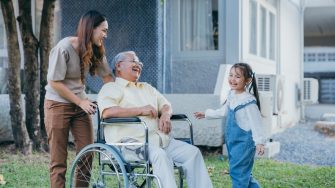New Study Sheds Light On Health And Wellbeing Of Carers
A new study into the health service use of carers have has offered valuable insights into the unique challenges faced by this group.
A new study into the health service use of carers have has offered valuable insights into the unique challenges faced by this group.

Carers constitute a significant portion of the Australian community and play a critical yet often overlooked role in the nation’s care system. Deloitte estimated in 2020 that the cost to replace all carers $77.9 billion. Although carers provide support to a range of people – including those who are frail aged, living with disabilities and certain chronic illnesses – they face significant challenges and pressure in their daily lives which can affect their health and wellbeing. There is currently a lack of understanding of the impact of being a carer on a person’s health and wellbeing compared to non-carers.
The study, led by Dr Ben Harris-Roxas (Senior Lecturer at UNSW and Associate Investigator at the UNSW Ageing Futures Institute) as part of the Central and Eastern Sydney Primary and Community Health Cohort, aimed to identify the effect of carer status on the health status, health risks, and health service use of carers, and the association between GP use and hospitalisations for carers and non-carers. Data was linked from the 45 and Up Study, Medicare Benefit Scheme claims, hospitalisations and deaths data for carers across the Central and Eastern Sydney region.
Carers were more likely to be female, married, and to speak a language other than English. They also reported higher rates of health risks such as smoking, higher psychological distress, and having anxiety or heart disease. Despite these challenges, carers did not show significantly worse hospitalisation rates or mortality rates compared to non-carers. Importantly, carers were found to have significantly higher General Practitioner (GP) use compared to non-carers.
“This study shows GPs play a crucial role in identifying and supporting carers. Given their high level of engagement with primary care, general practitioners can serve as a crucial point of contact for carers.” says Dr Harris-Roxas.
“People often become carers suddenly, and it’s a significant transition. This research is an important step forward in understanding how caring roles change and what the impact is on health services. We’re fortunate with this study to have our partnership with South Eastern Sydney Local Health District, Sydney Local Health District, and the Central and Eastern Sydney Primary Health Network. This guides our research to make sure we’re addressing practice relevant questions, and provides a clear pathway for informing planning and clinical services.
The number of carers is increasing at the same time that our health and social care systems are becoming more complex and fragmented. We need to develop effective mechanisms to identify and support carers, and general practice plays a critical role.”
Read the full publication here